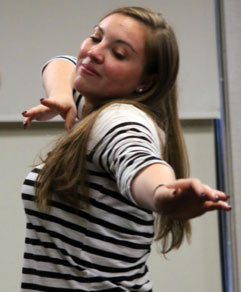R-DMT Alternate Route Training Information
Alternate Route Students |
|||||||||||||||||||||||
AR Course Credit Category Breakdown |
||
|
Theory & Practice |
Movement Observation |
General Training |
|
18 semester credits (15 credits must be in-person) |
6 semester credits (4 credits must be in-person, hyflex, or via synchronous learning) |
18 semester credits (any format) |
|
Group DMT |
Anatomy/Kinesiology 1 semester credit (any format) |
|
|
3 semester credits (must be in-person) |
||
The following should be noted by all students pursuing the R-DMT via the Alternate Route:
- The student is required to complete the Alternate Route Intention Form by the completion of 8 credits, documenting the official beginning of AR training.
- The student should be familiar with the R-DMT Handbook
- Alternate Route Dance/Movement Therapy courses do not have to be taken within an academic institution. However, all courses must either be pre-approved or offered through an approved Dance/Movement Therapy program. Only approved Alternate Route courses are listed in the Alternate Route Course Calendar.
- All Alternate Route dance/movement therapy history, theory, practice, and professional development courses not offered through ADTA approved academic programs must be approved by the Subcommittee for the Approval of Alternate Route Courses. Such approval is sought by the teacher of the course. Courses taken prior to March 15, 2013 do not require pre-approval but are not automatically accepted by the DMTCB.
- If you are using courses taken prior to March 15, 2013, toward your R –DMT application, you must comply with the documentation requirements in the R-DMT Handbook.
- Applicants are advised to consider the requirements for licensure as a mental health practitioner in their state of residence.
Alternate Route FAQs
Where can I find out about Alternate Route Courses?
Current Alternate route course offerings are listed in the Alternate Route Course Calendar, in the ADTA Forum under Announcements, and on the ADTA Facebook and LinkedIn sites. Check these sites regularly, as new information is posted daily.
Please note: Many Alternate Route courses are not offered on a regular basis. We encourage everyone to contact the provider directly for more information.
Where can I take Alternate Route Courses?
Alternate Route coursework can be taken through ADTA approved academic programs, institutions, or from specific instructors. Refer to the Alternate Route Coursework document and R-DMT Handbook for specific details. College credit can be earned for AR courses taken through approved master’s programs. For some institutes and free-standing courses, college credit can be arranged. Contact the institute director or course educator for details.
Who can I contact for questions about pursuing the Alternate Route?
If you have questions that are not answered in the R-DMT Handbook or the links listed below, contact the Chair of the Alternate Route Education Sub-Committee at [email protected].
| Alternate Route Student Resources |
Alternate Route Educators
Alternate Route Dance/Movement Therapy coursework must be approved by the ADTA. Approval indicates to students and the public that courses meet the ADTA Education and Clinical Training Standards, as granted by the Subcommittee for Approval of Alternate Route Courses. The Education and Clinical Training Standards have recently been revised and will be implemented for Alternate Route training in a two-tiered process. Refer to the Implementation Plan for details.
Would you like to offer an Alternate Route Course?
Click here for more information on the approval process for Alternate Route courses.
- Alternate Route course applications submitted after January 1, 2020, must meet the revised standards as described in the application form.
- By January 2025, all courses approved prior to 2020 must be resubmitted (at no cost) to show compliance with revised standards. This process will be phased in from oldest to newest courses, as shown in the Committee on Approval Procedural Guidelines for Alternate Route Course Transition to Revised Standards.
- Courses are approved for a period of 5 years and are then subsequent to re-approval every 5 years thereafter.
| Alternate Route Instructor Resources |
|


